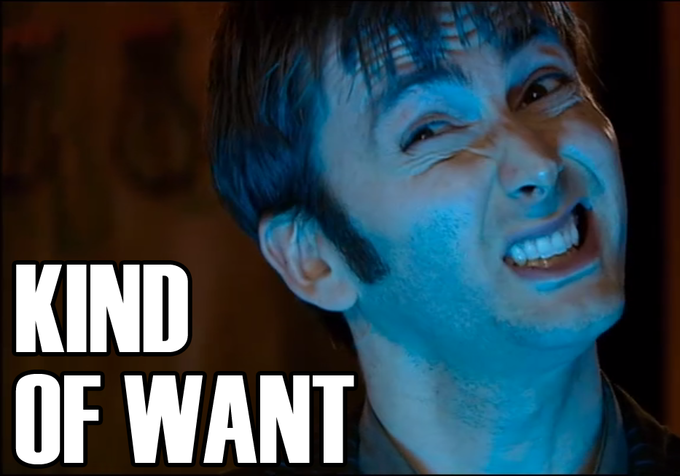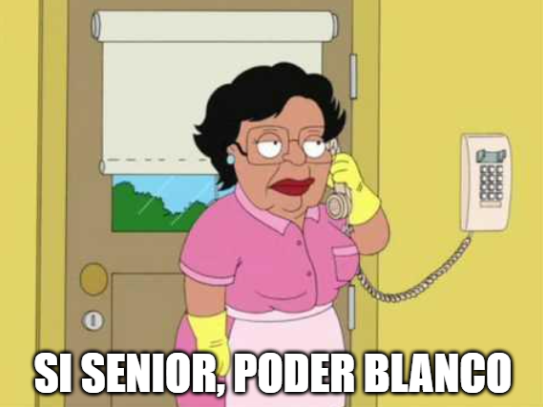😮
Yeah, that's a good example. "Oh, so you don't presuppose that you're alive, that you're on earth, that your perceptions of reality through your eyes and ears are accurate enough that you can make judgements based on those? That your mind is clear enough that you can use it to make judgements?"
Doesn't seem like a lot, but just the above isn't stuff you can just take for granted necessarily. If any of those presuppositions are wrong then you can't move forward with any conclusions!
Yeah, that's a good example. "Oh, so you don't presuppose that you're alive, that you're on earth, that your perceptions of reality through your eyes and ears are accurate enough that you can make judgements based on those? That your mind is clear enough that you can use it to make judgements?"
Doesn't seem like a lot, but just the above isn't stuff you can just take for granted necessarily. If any of those presuppositions are wrong then you can't move forward with any conclusions!
I like to think that I want to see opinions I disagree with, and I'm mutuals with people who I think prove that out. People I respect but nonetheless disagree with strongly on important things.
Thing is, opinions I disagree with need to have some grounding in reality, or it's just slamming my head against a brick wall! I'm not a teenager anymore, I don't want to just argue with people who are wrong on the Internet.
At least *try* to change my mind rather than just assuming you've already captured it and saying stuff that's divorced from reality, logic, and common sense, you know?
Thing is, opinions I disagree with need to have some grounding in reality, or it's just slamming my head against a brick wall! I'm not a teenager anymore, I don't want to just argue with people who are wrong on the Internet.
At least *try* to change my mind rather than just assuming you've already captured it and saying stuff that's divorced from reality, logic, and common sense, you know?
The economy keeps crashing over and over again after they promise it won't happen again. And quality of life keeps getting worse for the common man while it keeps getting better for the richest of the rich.
It should be a base assumption that even if we can't agree on what a better system looks like, the current system doesn't accomplish anything it claims to attempt. At best, it makes numbers look good so they can stab us in the back and tell us it's healthy to feel that sharp pain.
It should be a base assumption that even if we can't agree on what a better system looks like, the current system doesn't accomplish anything it claims to attempt. At best, it makes numbers look good so they can stab us in the back and tell us it's healthy to feel that sharp pain.
We've got our eye on you and your Rock and Roll music and blue jeans and comic books and talkie movies and...
So.... a judge imagines that something could potentially happen so jurors should take basic measures, and that means it absolutely will happen and you can attack the people who haven't done anything as if they did the thing?
Of course it does. I don't even know why I bothered asking.
Of course it does. I don't even know why I bothered asking.
Gaming press had some decent examples back in the day.
The problem is that it seems the brown nosers survived where the honest failed. :(
The problem is that it seems the brown nosers survived where the honest failed. :(
Sounds like a good choice to me.
If people want to turn off different features they should be allowed to.
If people want to turn off different features they should be allowed to.
New turing test "tell me how many people Mao's policies killed without telling me something "it's important to note"
Difficulty level: impossible
Difficulty level: impossible
America pays for universal healthcare, it just doesn't get it.
What's going on with all that money being collected?
What's going on with all that money being collected?
I'm pretty shocked at the number of people casting shade at a guy while he literally holds a holy hand grenade.
I kinda like the idea of being able to just say "yeah, this user but without the images" without having to be an admin and do it for the whole instance using mrf
Tbf, of course you'd seek to dismiss first. If you thought you might be able to swing some dismissals on failure to state a claim or something that's just free wins.
I'll say, I was arguing on the Internet since the 90s.
But it was just arguing. Afterwards everyone went their separate ways.
Politics were in there, but they were sorta this random smattering of stuff until 2003 when the war in Iraq had people picking sides. At that point it was "you're either with us or against us" and a lot of people picked sides.
But even then, it was just arguing. More polarized for sure, but afterwards everyone went their separate ways. It was sorta considered bad form to take it any further.
2008 and the election of Barack Obama I think was a major milestone in breaking the Internet. A lot of his success was using astroturf (or maybe it was real grassroot support, but I have my doubts) on the Internet, and suddenly something that was sort of a side hustle for politicians became a primary focus. At the time it seemed like a good thing because the Internet was getting attention, but in reality politicans are scumbuckets (even the ones we like) so they started pouring millions of dollars into breaking discourse and found some really dark corners of the Internet to help.
The frog in the water analogy fits the situation where the hate slowly got turned up. The water was getting warmer in the early 2010s, but even by 2015 it was still not totally the end of the world, but 2016 definitely broke a lot of people. Not just a little, either. There are creators who were consistently creating good stuff in 2015 and in 2016 they stopped and never started again.
What changed is it went from "I disagree with you" to "I'm going to find you and destroy your life". That's the result of the total war that is the culture wars post-Trump.
It's like a bunch of morons forgot the zeroth rule of the Internet, that is "The Internet is not real life".
The consequences are starting to play out, and it isn't pretty. It won't be good for anyone of any political persuasion.
But it was just arguing. Afterwards everyone went their separate ways.
Politics were in there, but they were sorta this random smattering of stuff until 2003 when the war in Iraq had people picking sides. At that point it was "you're either with us or against us" and a lot of people picked sides.
But even then, it was just arguing. More polarized for sure, but afterwards everyone went their separate ways. It was sorta considered bad form to take it any further.
2008 and the election of Barack Obama I think was a major milestone in breaking the Internet. A lot of his success was using astroturf (or maybe it was real grassroot support, but I have my doubts) on the Internet, and suddenly something that was sort of a side hustle for politicians became a primary focus. At the time it seemed like a good thing because the Internet was getting attention, but in reality politicans are scumbuckets (even the ones we like) so they started pouring millions of dollars into breaking discourse and found some really dark corners of the Internet to help.
The frog in the water analogy fits the situation where the hate slowly got turned up. The water was getting warmer in the early 2010s, but even by 2015 it was still not totally the end of the world, but 2016 definitely broke a lot of people. Not just a little, either. There are creators who were consistently creating good stuff in 2015 and in 2016 they stopped and never started again.
What changed is it went from "I disagree with you" to "I'm going to find you and destroy your life". That's the result of the total war that is the culture wars post-Trump.
It's like a bunch of morons forgot the zeroth rule of the Internet, that is "The Internet is not real life".
The consequences are starting to play out, and it isn't pretty. It won't be good for anyone of any political persuasion.
(long post of me just laying things out and trying to make sense of info...)
America has always had guns and it's inarguable that those guns have led to tragedies throughout its history, but it seems to me that the concept of mass shootings as these routine crimes of passion that aren't related to other crime (Unfortunately, the US is the worst in the world for gun crime that's related to other crime, and that's a separate issue) is a relatively recent phenomenon.
In the late 60s we started seeing some "clock tower snipers" who got up on high towers and started shooting random people, and we had a couple instances in the 1970s, but it wasn't until the 1980s that the term "mass shooting" entered the cultural lexicon.
It was the 1990s that the concept of "going postal" started to grow culturally popular, and in 1999 the columbine massacre occurred and obviously was unusual and shocking enough that the entire world was paying attention. The rate seemed to increase slowly until lately we've been seeing a few notable instances per year.
Unfortunately, the crime is hard to parse out since mass shooting data will include mass shootings related to other crime such as gangland shootings. Such mass shootings are no less tragic, but gangs going around killing each other or innocent people while committing crimes are going to have much different roots than otherwise law abiding individuals grabbing a gun and randomly shooting at innocent people. I live in a pretty remote area, and we recently had a shootout among gang members, some of whom were exported from the US.
On the topic of crime in the US, it's also inarguable that violent crime in the US is way down. The early 1990s were terrible for violent crime, with numbers massively peaking. Today numbers per capita are way below the peak 1990 numbers, but they're still above the 1960s numbers by far, and they're also well above the trough of the post-1990s decline that occurred in 2014. https://www.disastercenter.com/crime/uscrime.htm
But at the end of the day, I don't know enough to be able to say what is or isn't the cause of the mass shootings unrelated to any other crime as a routine crime of passion. It just seems strange that the problem sort of showed up and started growing. It's like this creeping cultural contagion, and one that is unique to the United States for the past 40 years or so.
It's like... what's different from other countries, and what's changed in the US that would cause this slow growth in something absolutely horrific?
America has always had guns and it's inarguable that those guns have led to tragedies throughout its history, but it seems to me that the concept of mass shootings as these routine crimes of passion that aren't related to other crime (Unfortunately, the US is the worst in the world for gun crime that's related to other crime, and that's a separate issue) is a relatively recent phenomenon.
In the late 60s we started seeing some "clock tower snipers" who got up on high towers and started shooting random people, and we had a couple instances in the 1970s, but it wasn't until the 1980s that the term "mass shooting" entered the cultural lexicon.
It was the 1990s that the concept of "going postal" started to grow culturally popular, and in 1999 the columbine massacre occurred and obviously was unusual and shocking enough that the entire world was paying attention. The rate seemed to increase slowly until lately we've been seeing a few notable instances per year.
Unfortunately, the crime is hard to parse out since mass shooting data will include mass shootings related to other crime such as gangland shootings. Such mass shootings are no less tragic, but gangs going around killing each other or innocent people while committing crimes are going to have much different roots than otherwise law abiding individuals grabbing a gun and randomly shooting at innocent people. I live in a pretty remote area, and we recently had a shootout among gang members, some of whom were exported from the US.
On the topic of crime in the US, it's also inarguable that violent crime in the US is way down. The early 1990s were terrible for violent crime, with numbers massively peaking. Today numbers per capita are way below the peak 1990 numbers, but they're still above the 1960s numbers by far, and they're also well above the trough of the post-1990s decline that occurred in 2014. https://www.disastercenter.com/crime/uscrime.htm
But at the end of the day, I don't know enough to be able to say what is or isn't the cause of the mass shootings unrelated to any other crime as a routine crime of passion. It just seems strange that the problem sort of showed up and started growing. It's like this creeping cultural contagion, and one that is unique to the United States for the past 40 years or so.
It's like... what's different from other countries, and what's changed in the US that would cause this slow growth in something absolutely horrific?
Cannabis-Induced Psychosis is something where under heavy cannabis use, you start to exhibit signs of psychosis including hearing things that aren't there.
There's also a pain condition called Cannabis hyperemesis syndrome that is not well known but it causes heavy pain and vomiting and emergency room visits.
They aren't well-known, but they should be. Some people toke their entire lives and don't have a problem, but other people do have problems and because of the way people talk about pot nobody knows that the potential issues can come up.
I'm not invoking reefer madness here, it's more like "be fully aware of the things you put in your body". Pot isn't a magic spell, it's a drug with positive sides and negative sides.
There's also a pain condition called Cannabis hyperemesis syndrome that is not well known but it causes heavy pain and vomiting and emergency room visits.
They aren't well-known, but they should be. Some people toke their entire lives and don't have a problem, but other people do have problems and because of the way people talk about pot nobody knows that the potential issues can come up.
I'm not invoking reefer madness here, it's more like "be fully aware of the things you put in your body". Pot isn't a magic spell, it's a drug with positive sides and negative sides.


